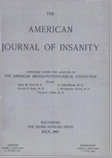ANALYSIS OF SPOKEN LANGUAGE OF PATIENTS WITH AFFECTIVE DISORDERS
Abstract
Clinical descriptions and language analyses are presented of four patients with affective disorders. The characteristics of speech are discussed which were most consistently observed in each syndrome as based on a study of 40 patients of which the four described in detail are representative. The observations are outlined in the following table:
One atypical case, presenting a mixed state of the manic-depressive group, is described in which pressure of activity and speech was associated with depression, apprehension, bewilderment and self-accusations. Speech analysis showed vigorous articulatory movements; wide pitch range; gliding pitch changes associated with accents; fast speech tempo; infrequent, prosodic pauses; pharyngeal resonance; absence of glottal rasping; colloquial level of style; extreme and frequent degree concepts; rich syntactic elaboration with diversified syntactic techniques; quick initiation of responses; lengthy responses dealing with single theme but disordered in sequence.
Access content
To read the fulltext, please use one of the options below to sign in or purchase access.- Personal login
- Institutional Login
- Sign in via OpenAthens
- Register for access
-
Please login/register if you wish to pair your device and check access availability.
Not a subscriber?
PsychiatryOnline subscription options offer access to the DSM-5 library, books, journals, CME, and patient resources. This all-in-one virtual library provides psychiatrists and mental health professionals with key resources for diagnosis, treatment, research, and professional development.
Need more help? PsychiatryOnline Customer Service may be reached by emailing [email protected] or by calling 800-368-5777 (in the U.S.) or 703-907-7322 (outside the U.S.).



